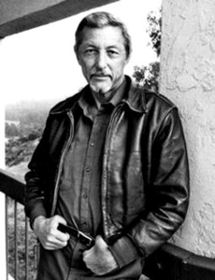| |
Evan S. Connell, KC native and author of 'Mrs. Bridge,' dies at 88
---by Steve Paul, The Kansas City Star
January 11, 2013
The two books became a movie starring Paul Newman and Joanne Woodward. “Mr. and Mrs. Bridge,” produced and directed by the British art-film team of James Ivory and Ismail Merchant, was made in Kansas City in 1990.
In 2010, Connell reflected on “Mrs. Bridge,” which had recently passed its 50th anniversary.
“If I look at ‘Mrs. Bridge’ now,” he told The Star, “I find sentences I would have revised or eliminated. Occasionally, I think of something that belongs in the book that I didn’t think of at the time, but I think it reads pretty well.”
Connell was born in Kansas City on Aug. 17, 1924. His father, Evan Connell Sr., was a physician and had a house built for the family at 210 W. 66th St. The younger Evan graduated from Southwest High School in 1941 and the University of Kansas in 1947. He left Kansas City for the West Coast many years ago and lived for more than 20 years in Santa Fe.
He never married, had no children, but produced nearly 20 often challenging and aesthetically rewarding books of fiction, nonfiction and poetry.
He published his first book, a story collection, in 1957.
“Son of the Morning Star: Custer and the Little Big Horn” came out in 1984, sold well and became a television miniseries in 1991.
As a writer he was never much of a household name, but he was admired in literary and critical circles. He won a lifetime award from the Lannan Foundation in 2000. He was a finalist for a Man Booker International Prize in 2009 and the following year he received a lifetime achievement award from the Los Angeles Times.
His works are frequently steeped in art and history.
“The Connoisseur” (1974) is one of Connell’s most immediately accessible novels, perhaps his “most undeservedly overlooked work,” Scott Ditzler wrote for a Star profile three years ago. “The novel,” Ditzler wrote, “follows Muhlbach, one of Connell’s recurring characters, an insurance executive who purchases a small Mayan statue at a shop outside Taos, N.M., and in doing so ignites an interest in pre-Columbian art that soon becomes an obsession.”
In recent years Connell published a historical novel based on his deep research of the Crusades (“Deus Lo Volt”), and a biography of the Spanish painter Francisco Goya. His most recent book was “Lost in Uttar Pradesh,” a collection of new and previously published short stories that range over time, place and settings.
“He was a most interesting man,” his sister said. “He was funny, too.”
A few years ago two knee surgeries triggered a heart problem, and Connell had a pacemaker and used a wheelchair.
But in that conversation with The Star in 2010, he was sharp, self-deprecating and well aware of his place in the literary firmament.
“Just about the only book I’m completely satisfied with is the book I did about General Custer,” he said. “I can open that book and read almost any page without flinching.”
Writing about a collection of Connell’s stories in 1995, area writer Conger Beasley Jr. called him “a master stylist, a brilliant portraitist and psychologist” as well as “the least-known, least-appreciated major writer working in America today.”
Beasley called him a stylist with few peers: “He writes solid, perfect-pitch prose, painstakingly crafted, balanced and clear. His eye for detail is exact, as in this excerpt from ‘Mrs. Proctor Bemis:’”
She decided to think about how nice Kansas City had been when she was a child. How pleasant and comfortable everything used to be. She thought about her parents. She thought about her brown and white dog Hopscotch. She remembered one Sunday in April when all of them got into the car, including Hopscotch, and they drove to Swope Park for a picnic. She had made a collar of dandelions for Hopscotch and a butterfly landed on the potato salad.
On his writing career, Connell told The Star in 2010: “You have to resign yourself. If you know how to manufacture things that are commercially successful, then you keep doing the same thing over and over. I think that’s what most of the commercially successful writers do; they hit on a subject or some characters that are popular with the public, and so the tendency is to do one more, and then do one more, and so on. If you don’t know how to do that sort of thing, then you’re probably in trouble.”
A private memorial is planned in the spring. In lieu of flowers, donations can be made to Bread for the World in Washington, D.C.
Return to Evan S. Connell Jr.
Return to Top of Page |
|
|

![]() Return to Lawrence
Return to Lawrence![]() Return to KANSAS MAP
Return to KANSAS MAP


